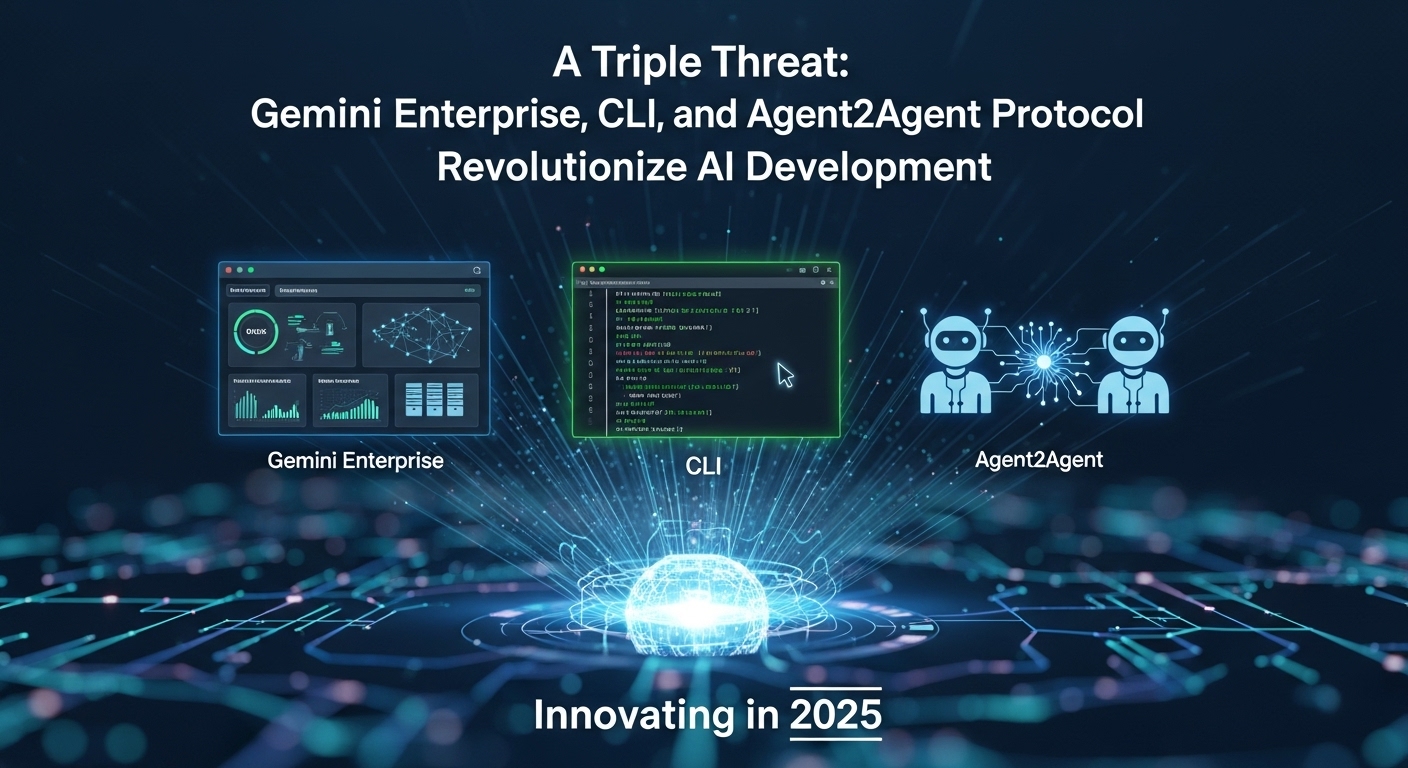【速報】Googleが「Gemini Enterprise」で企業AIの新時代を宣言!開発者向けCLIとA2Aプロトコルで未来を加速する全貌
2025年10月、Googleは企業におけるAI活用の未来を大きく変革する「Gemini Enterprise」を発表しました。同時に、開発者向けの強力なツールである「Gemini CLI」と、AIエージェント間の協調を可能にする「Agent2Agent Protocol (A2A)」も導入され、AIエコシステムは新たな局面を迎えています。これらの発表は、単なる技術的進歩にとどまらず、ビジネスのあり方、そして開発者の働き方にまで深い影響を与えるでしょう。本記事では、Googleが描くAI戦略の全貌を深く掘り下げていきます。
Googleの最新発表:企業向けAIの新たな幕開け「Gemini Enterprise」
Google CEOのSundar Pichai氏が「Gemini at Work」イベントで発表した「Gemini Enterprise」は、企業のAI活用を次のレベルへと引き上げる統合プラットフォームです。これは単なるチャットボットの域を超え、企業内のデータ、ツール、そして人々をセキュアな一箇所に集約する包括的なプラットフォームとして設計されています。
- 全従業員へのAIの力: Gemini Enterpriseは、あらゆる従業員があらゆるワークフローでGoogle AIの全機能を利用できるようにすることを目指しています。企業文書、データ、アプリケーションと対話できるチャットインターフェースを通じて、AIが日々の業務に深く統合されます。
- 既存システムとのシームレスな連携: Google Workspaceはもちろん、Microsoft 365、Salesforce、SAPといった主要なビジネスアプリケーションとも安全に接続し、既存のITインフラを活かしたAI導入が可能です。
- マルチモーダル対応とエージェントエコシステム: Gemini Enterpriseは、テキスト、画像、動画、音声といったマルチモーダルな情報を理解し、生成するエージェントをWorkspaceアプリに組み込むことができます。さらに、1,500以上の既成AIエージェントと10万以上のパートナーエコシステムを提供し、ノーコードでのエージェント構築・オーケストレーションを可能にするAgentspaceの機能も統合されています。 HCA HealthcareやBest Buyといった企業がすでに早期導入を進め、業務改善に成功しているとのことです。
開発者の生産性を飛躍させる「Gemini CLI」の登場
開発者にとって、ターミナルは日々の作業の中心です。そのターミナルに直接AIの力を持ち込むのが、オープンソースのAIエージェント「Gemini CLI」です。2025年6月に発表され、10月8日には拡張機能フレームワークも追加されました。
- ターミナルでのAI活用: Gemini CLIは、コード理解、ファイル操作、コマンド実行、動的なトラブルシューティングなど、幅広いAI機能を提供します。自然言語でコードの記述、デバッグ、ワークフローの合理化が可能になり、開発者の生産性を飛躍的に向上させます。
- オープンソースとしての利点と無料枠: オープンソースであるため、コードを検査し、開発に貢献することができます。また、個人のGoogleアカウントを使用すれば、Gemini 2.5 Proへのアクセスを含む無料利用枠が提供されるため、多くの開発者が気軽に利用を開始できます。
- 拡張機能によるカスタマイズ性とMCPとの連携: Gemini CLIの最大の魅力の一つは、その拡張性です。わずか3ヶ月で100万人以上の開発者が利用するに至ったこのツールは、外部ツールとの連携を可能にする拡張機能フレームワークを提供します。 これにより、Dynatrace、Elastic、Figmaなどの業界パートナー製の拡張機能や、コミュニティによって開発されたツールをターミナルから直接利用できるようになります。これらの拡張機能は、Model Context Protocol (MCP) を基盤としており、ツールとの基本的な接続に加えて、文脈とインテリジェンスを追加することで、よりスマートなインタラクションを実現します。
AIエージェントの協調作業を実現する「Agent2Agent Protocol (A2A)」
AIの進化は、単一のタスクに特化したエージェントから、相互に連携し複雑な問題を解決するエコシステムへと移行しています。このビジョンを現実にするための鍵となるのが、「Agent2Agent Protocol(A2A)」です。2025年4月にオープンプロトコルとして発表され、7月にはバージョン0.3がリリースされました。
- エージェント間の「共通言語」: A2Aは、異なるフレームワーク、ベンダー、クラウド環境で構築されたAIエージェントがセキュアに通信できる共通のAI通信標準を提供します。これにより、AIエージェントが互いの「内部の脳」やコードの詳細を知ることなく、あたかも「普遍的な翻訳機」を通じて会話するように、シームレスに協力することが可能になります。
- 異なるプラットフォーム・ベンダー間の相互運用性: A2Aの目標は、AIエージェント間のサイロを打破し、複雑なエンタープライズワークフローを自動化するために、それらが協調して動作できるようにすることです。 gRPCサポート、セキュリティカードの署名機能、Python SDKのクライアントサイドサポートの拡張など、より安定したインターフェースとセキュリティが提供されています。
- ビジネスにおける具体的な活用事例: A2Aはすでに150以上の組織から支持を得ており、Tyson FoodsとGordon Food Serviceがサプライチェーンの摩擦を減らすために、Adobeが分散エージェントの相互運用性のために、S&P Global Market Intelligenceがエージェント間通信のために活用するなど、具体的な導入事例が生まれています。
Googleが描くAIエコシステムの未来
Googleの一連の発表は、企業がAIをどのように導入し、開発者がどのようにAIを構築するかという両面において、AIの未来図を明確に示しています。「Gemini Enterprise」が企業変革の「フロントドア」となる一方で、開発者は「Gemini CLI」でAIを日々の作業に統合し、「A2A Protocol」によってAIエージェントが国境を越えて協調する未来が描かれています。
Googleは、Gemini Enterprise Agent Ready (GEAR) プログラムを通じて100万人の開発者を育成し、AIエージェントの構築と展開を支援する計画も発表しており、AIの民主化と協調的インテリジェンスの実現に向けた強力なコミットメントを示しています。 これは、AIが単独のツールではなく、相互に作用し、人間の能力を拡張する統合されたエコシステムとして機能する未来を創出するものです。この新しいAIの波は、私たちの働き方、ビジネスの運営方法、そしてイノベーションの加速に計り知れない影響を与えることでしょう。
Google Unleashes a Triple Threat: Gemini Enterprise, CLI, and Agent2Agent Protocol Revolutionize AI Development in 2025
The landscape of artificial intelligence is experiencing an unprecedented acceleration, and Google is once again at the forefront, pushing the boundaries of what’s possible for both enterprises and individual developers. Recently, Google unveiled a powerful trio of innovations: Gemini Enterprise, the Gemini Command Line Interface (CLI), and the Agent2Agent (A2A) Protocol. These announcements are set to fundamentally reshape how businesses integrate AI and how developers build agentic applications, promising a future of unparalleled productivity and innovation.
Gemini Enterprise: The Unified AI Powerhouse for Businesses
At its core, Gemini Enterprise is Google Cloud’s advanced agentic AI platform, designed to unify Gemini models, first-party, and third-party agents, along with orchestration technology previously known as Agentspace. It serves as a “single front door” for all AI interactions within the workplace, moving beyond simple chatbots to transform entire workflows. The platform’s primary mission is to enable the creation of multi-step, process-driven AI agents, seamlessly integrating with an enterprise’s data and the latest AI models.
Businesses leveraging Gemini Enterprise gain access to Google’s most advanced Gemini models, including the potent Gemini 2.5 Flash Image, providing world-class intelligence for every task. A standout feature is its intuitive no-code workbench, empowering users across various corporate functions—from marketing to finance—to orchestrate agents and automate complex processes without extensive coding knowledge. Google is also offering a suite of pre-built agents, such as the Data Science Agent (in preview) for automating data wrangling and ingestion, Deep Research, and NotebookLM, providing immediate value out-of-the-box.
A significant advantage of Gemini Enterprise is its deep integration capabilities. It breaks organizational data silos by connecting securely to a wide array of corporate data sources, including Google Workspace, Microsoft 365, Salesforce, and SAP. This allows agents to build rich context, delivering more relevant and trustworthy results. The platform supports multimodal agents that can understand and generate text, image, video, and speech, enhancing applications like Google Vids for video creation and Google Meet for real-time translation. Furthermore, Google is committed to an open strategy, ensuring Gemini Enterprise works seamlessly within diverse environments and fostering a robust ecosystem of partners like Box, Salesforce, and ServiceNow, who are already building compatible agents. A new AI agent finder allows customers to discover and deploy thousands of validated partner solutions. With built-in security features such as VPC-Service Controls and Customer-Managed Encryption Keys, and a central governance framework, businesses can manage their AI initiatives with confidence.
Empowering Developers with Gemini CLI: AI at Your Fingertips
For developers, Google has introduced the Gemini Command Line Interface (CLI), an open-source AI agent that brings the raw power of Gemini directly into the terminal. This tool is designed to significantly enhance the developer experience by offering direct and lightweight access to Gemini models, making the command line an even more potent environment for productivity.
The Gemini CLI operates using a “reason and act” (ReAct) loop, leveraging both its built-in tools and Model Context Protocol (MCP) servers to tackle complex use cases. Developers can use it for a wide range of coding tasks, including fixing bugs, creating new features, improving test coverage, explaining code, generating documentation, and refactoring. Its versatility extends beyond coding, assisting with content generation, problem-solving, and deep research. The free tier offers generous usage limits—60 requests per minute and 1,000 requests per day—with access to Gemini 2.5 Pro’s 1M token context window for personal Google accounts.
Being open-source and Apache 2.0 licensed, Gemini CLI encourages community contributions, fostering a collaborative environment for its evolution. It shares technology with Gemini Code Assist, providing integrated AI assistance within popular IDEs like VS Code. The CLI’s built-in tools, such as Google Search grounding, file operations, shell commands, and web fetching, enable it to interact with the local environment and access real-time information. Crucially, its extensibility via MCP servers allows developers to integrate with third-party systems like Jira, GitHub, or Confluence, extending its capabilities far beyond its core features. Recently, Google also announced Gemini CLI extensions, a framework that lets developers connect the CLI to external tools without leaving the terminal, with support from partners like Dynatrace, Elastic, and Figma. These extensions bundle MCP servers, context files, and custom commands, simplifying distribution and installation. The Gemini CLI also supports a non-interactive mode, making it ideal for automating tasks within CI/CD pipelines.
Agent2Agent Protocol: Unlocking Collaborative AI’s Full Potential
Perhaps one of the most significant steps towards a truly interconnected AI ecosystem is the introduction of the Agent2Agent (A2A) Protocol. This open standard, developed by Google, addresses a critical challenge in the AI landscape: enabling AI agents, built on diverse frameworks by different companies and running on separate servers, to communicate and collaborate effectively. The A2A Protocol aims to break down the silos that often isolate specialized AI agents, fostering complex collaboration where individual agents can work together on tasks that a single agent cannot handle alone.
The protocol is designed with five key principles, emphasizing agentic capabilities, allowing agents to collaborate in their natural, unstructured modalities without sharing their internal memory, tools, or context—a concept known as “opaque execution.” This ensures security and protects intellectual property while facilitating seamless interaction. A2A supports modality-agnostic communication, handling text, audio/video, forms, and more. Communication is standardized using JSON-RPC 2.0 over HTTP(S), and agents can discover each other’s capabilities through “Agent Cards”—standardized `.well-known/agent.json` files that detail their functionalities. The protocol supports flexible interactions, including synchronous request/response, streaming, and asynchronous push notifications, and is designed to be enterprise-ready with built-in security, authentication, and observability features.
A2A is complementary to the Model Context Protocol (MCP); while MCP focuses on tool integration, A2A specifically targets agent-to-agent collaboration, forming a complete agent ecosystem when used together. The protocol has garnered significant industry support, with over 150 organizations, including major technology providers and multinational customers, backing its adoption. The recent release of version 0.3 further enhances its capabilities with gRPC support, security card signing, and extended client-side support in the Python SDK. Integrated with Google’s Agent Development Kit (ADK), A2A is paving the way for developers to build, deploy, evaluate, and even sell A2A agents within the Google Cloud ecosystem.
A New Era of AI Innovation for All
Google’s strategic launch of Gemini Enterprise, Gemini CLI, and the Agent2Agent Protocol signifies a pivotal moment in AI development. By providing a unified, secure platform for enterprise AI, empowering developers with a direct AI command-line agent, and establishing an open standard for inter-agent communication, Google is laying the groundwork for a future where AI is not just a tool, but a collaborative partner in every workflow. This comprehensive approach promises to accelerate innovation, democratize advanced AI capabilities, and unlock unprecedented levels of productivity across industries, truly ushering in a new era of AI-driven transformation.





🐦 SNSでシェアする
この記事が役に立ったら、ぜひXでシェアしてね! @kawasho_web をつけて感想を教えてくれると、とっても嬉しいな✨
🐦 @kawasho_web をつけてXでシェア